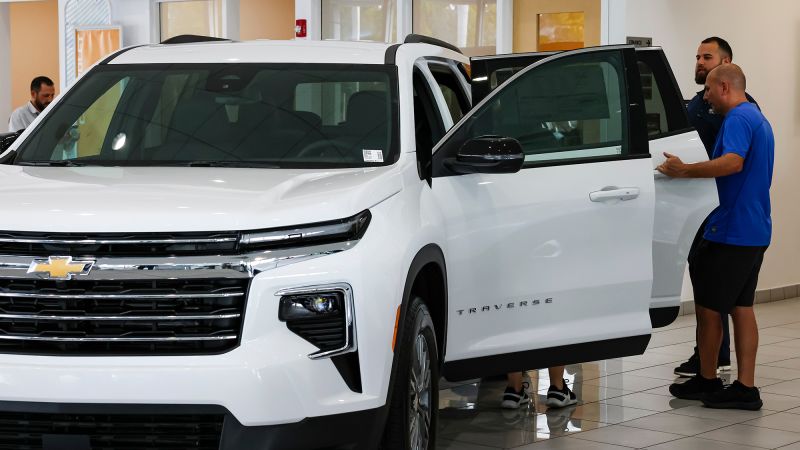Despite two months of customs tariffs, car prices are not increasing. Is now the time to buy?

CNN
—
American car buyers prepared for the worst when tariffs imposed by President Donald Trump took effect in April. But so far, prices have changed little.
However, industry experts don’t expect this to remain true for long if the tariffs remain in place. So Americans might want to buy a car now before prices start to rise in a few months.
“So far, there’s been a disconnect between expectations and the reality of what’s happened on pricing,” said Ivan Drury, director of research at car-buying research site Edmunds.com. “But I still think prices will start to take off in two to three months.”
Even with 25% tariffs on all imported cars and auto parts, prices are mostly kept in check.
The price paid for new cars in May fell an average of 0.2% from the previous month, according to Edmunds data, and they increased by only 2.5% compared to the pre-tariff period in March. This was also reflected in the government’s consumer price index for May, which reported falling prices for new and used cars after adjusting for seasonal factors.
Many factors keep prices stable. Tariff fears kept buyers away in April and May, and falling demand limited dealers’ ability to raise prices. Experts interviewed by CNN said the auto industry was also concerned about news of steep price hikes that could anger the Trump administration.
But for the most part, dealers continue to work on their supply of pre-priced cars. Most cars sold since the tariffs were imposed in April were either imported into the United States or built before the tariffs took effect, Drury said.
“The impact is not there yet,” he said.
As of March, automakers had a 30- to 77-day supply of cars on lots, depending on the manufacturer, according to Edmunds.
Plus, the customer demand just isn’t there. Some buyers rushed to buy cars in March before the tariffs were put in place, creating a surge in sales in the first quarter and weakening demand since then. Additionally, concerns about the economy and job security, as well as high interest rates, could prevent some from making a major purchase.
Although Edmunds has not yet given a sales forecast for the second quarter, Drury said “chances are good” that the trend will continue and that sales will be down or, at best, flat compared to the same period last year.
But Drury said the lack of price increases could start to entice consumers back into the car-buying market later this year. The Conference Board reported in May that 12.1% of U.S. consumers planned to buy a new car in the next six months. That’s a significant jump from the 10.6% who said the same in April, and is more in line with normal seasonal interest in car buying.
When customers return to the market for a car, they may see prices increase.
Every car manufacturer is affected by prices. Except for Tesla, all the big companies imports the cars they sell to U.S. dealerships from overseas factories, accounting for 46% of U.S. auto sales in 2024, according to S&P Global Mobility. Even those built in American factories use imported parts.
Drury said some manufacturers are already increasing their costs in ways that don’t show up in the price, such as by adding fees and reducing incentives offered to buyers. But as tariffed vehicles begin to hit the market, experts expect they will eventually pass on some of that cost.
Car prices are not set by car manufacturers: they are negotiated between dealers and buyers. But automakers set a “Manufacturer’s Suggested Retail Price” or MSRP, also known as the sticker price.
Adam Jonas, an auto analyst at Bank of America, thinks automakers will likely increase MSRP later this year when 2026 model year cars begin shipping to dealerships.
“We’re slowly hearing the news of rising prices,” Jonas said at a recent Bank of America conference. “I think with the move to 2026 models, (this) will be an opportunity for companies to raise prices on new vehicles so as not to anger some people who might criticize them for raising prices.”
Until then, automakers are willing to pay part of the cost of tariffs in reduced profits, partly because of weaker buyer demand, partly to avoid angering the Trump administration.
Drury said that even when automakers raise prices, they will be careful not to attribute those increases to tariffs.
“I think they learned there’s no good in doing that,” he said.
ـــــــــــــــــــــــــــــــــــــــــــــــــــــــــــــــــــــــــــــــــــــــــــــــــــــــــــــــــ
Soon, there will be articles covering various topics, such as:
Insurance, Loans, Mortgage, Attorney, Credit, Lawyer, Donate, Degree, Hosting, Claim, Conference Call, Trading, Software, Recovery, Transfer, Gas/Electicity, Classes, Rehab, Treatment, Cord Blood, Best mesothelioma lawyer, Truck accident lawyer, Buy life insurance online, Business VoIP provider, EMR software for clinics, Structured settlement companies, motorcycle injury lawyer, motorcycle injury attorney, spinal cord injury attorney, birth injury attorney, auto accident injury attorney, spinal cord injury lawyer, car injury attorney, motorcycle accident injury attorney, catastrophic injury lawyer, birth injury lawyer, workplace injury attorney, motorcycle injury attorneys, head injury lawyer, personal injury attorneys, traumatic brain injury attorney, train accident lawyer, brain injury attorney, auto injury attorney, serious injury attorney, personal injury lawyer, truck injury lawyer, injury attorneys, back injury lawyer, injury lawyer near me, injury lawyer,
If you would like to see these articles, please write so in the comments.




